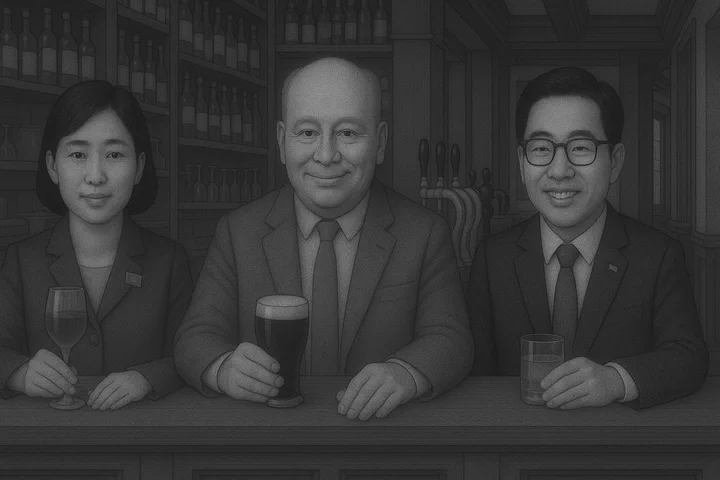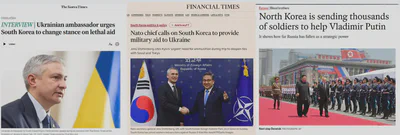Why the U.S. and NATO failed to secure South Korean support on Ukraine

After Russia’s full-scale invasion of Ukraine in 2022, the U.S. (Biden Administration), NATO, and European governments worked tirelessly to rally support from democratic allies around the world. They argued that Ukraine was not just fighting for itself but for the principles of freedom, sovereignty, and the rule of law.
In this effort, they turned to South Korea, a liberal democracy, a partner of NATO, and a country with its own bitter memories of invasion and division. Surely, the logic went, South Korea would understand.
But Seoul didn’t. It refused to donate lethal aid.
Despite being one of the world’s largest arms producers and a country often spoken of in the same breath as other U.S.-aligned democracies, South Korea consistently resisted calls to send lethal aid to Ukraine. Seoul preferred to frame its support in strictly humanitarian terms—medical supplies, energy equipment, reconstruction aid.
And while it benefited handsomely from arms sales to NATO countries, it kept its direct military assistance to Ukraine at arm’s length.
I watched the U.S., NATO, and European appeals to convince Seoul to donate lethal arms to Ukraine. One thought came to my mind—they’ve made the wrong pitch. They don’t know Korea.
Representatives from the U.S., NATO, and Europe appealed to empathy. They invoked democratic solidarity, historic parallels between Korea and Ukraine, and the threat to the “rules-based international order.” They invited Korean officials to symbolic events and talked about democratic solidarity. They asked South Korea to feel the weight of moral obligation.
But this was not how South Korea’s foreign policy worked. It never was. If Europe had understood that—if it had spoken to economic logic and self-interest rather than democratic ideals and emotional appeals—it might have gotten everything it wanted.
South Korea’s foreign policy is often misread by outsiders who assume that because the country is democratic, it must think like a liberal democracy. I’ve before talked about South Korea as the ultimate neo-mercantilist state. South Korea’s approach to the world is shaped far more by survival, trade, and economic strategy than by idealism.
The roots of this lie in the country’s modern history. South Korea rebuilt itself from the rubble of war through exports, aid, and security guarantees. Foreign policy was handled by elites behind closed doors, with no meaningful input from the public. Unlike in Europe, where foreign policy is influenced by public opinion, activist lobbies, or moral debates, South Korea’s foreign policy is highly centralized, technocratic, and transactional.
There is little room in this structure for empathy. There is enormous room for economic self-interest.
Ukraine and Europe assumed that moral solidarity would be enough to win South Korean support. They emphasized the shared experience of being invaded, of being divided by great power conflict, of living under the shadow of authoritarian neighbors. President Zelensky even referenced the Korean War in appeals to Korean lawmakers.
But South Korea didn’t bite—because none of that was new. Korea has lived with existential threat for decades. Emotional appeals to its past don’t override the strategic caution it applies to its future.

Instead, Seoul’s foreign policy establishment focused on risks: the risk of antagonizing Russia and inviting retaliation in energy, trade, or diplomacy; the risk of setting a precedent for involvement in other conflicts; the risk that support for Ukraine could be interpreted by Moscow as hostility, potentially complicating relations with China or with North Korea’s benefactors.
If Ukraine and Europe had instead framed their requests in terms of industrial benefit—arms deals, joint production lines, reconstruction contracts, preferential access to EU defense markets—they may have seen different results.
Indeed, it is precisely this logic that has driven Korea’s actual behavior: while refusing to send weapons directly to Ukraine, Korea ramped up arms sales to Poland, Estonia, and others, striking multi-billion dollar deals that bolster both its defense sector and its geopolitical relevance.
Another strategic mistake was the assumption that democracy alone creates foreign policy alignment. In reality, South Korea’s democracy has had almost no influence on its external behavior. The foreign ministry does not answer to a vocal public, and most voters do not cast ballots based on foreign policy positions. Parliamentarians rarely challenge foreign policy decisions. South Korea’s presidents, regardless of ideology, tend to treat foreign policy as a preserve of executive discretion—insulated from popular sentiment and driven by a small coterie of unanswerable advisors.
So when European leaders talked about shared values, Korean officials nodded politely, then went back to running cost-benefit analyses. Emotional language about “fighting for freedom” fell flat, not because Koreans reject those ideals, but because such language doesn’t weigh much against industrial policy, trade flows, and energy risks.
Europe had leverage—it just didn’t use it.
Had European governments tied requests for military support to increased Korean access to European defense procurement processes, or offered support for Korean defense exports in third markets, they might have found an eager partner. If they had pitched post-war reconstruction in Ukraine as a golden investment opportunity for Korean chaebols, or made concrete industrial co-development proposals, Seoul’s resistance could have softened.
Imagine for a second if those arms deals had been contingent upon South Korea putting its weight behind Ukraine? This is how to negotiate with South Korea!
Instead, Europe relied on soft language, assuming that empathy would do what incentives could not. South Korea, despite its OECD membership and alliance with the United States, is not easily understood by those outside the country.
South Korea’s refusal to arm Ukraine wasn’t hypocrisy. It was consistency.
It reflects a foreign policy tradition that is cold, cautious, and commercially minded—one that has never made room for the emotional appeals that shape diplomacy in Europe.
The lesson for Ukraine and Europe is simple: if you want Korea’s support, don’t appeal to its heart. Appeal to its balance sheet.
